It delivers a world of infinite convenience and selection to our fingertips...
Can architects and designers *really* design in Procreate, or is it just a glorified digital sketchbook? In today's tutorial for architects, designers and students, I demonstrate the "super powers" of Procreate that make it the ideal choice to imagine your design, develop it in scale, then hand it off for further development in Rhino or Sketchup. What makes Procreate such a powerful design tool is that it combines the best of both worlds…
Good things really do happen when you expect them the least.
For years I’ve been on the lookout for good ways to explain the advantages of designing and rendering by hand with Procreate, versus traditional designing and rendering by hand with pencil on paper. I haven't found the exact right words yet, but I keep looking.
Then this morning I woke up and saw on Twitter that the cartoonist Gary Larson was starting to cartoon again. He retired from drawing "The Dark Side" about 10 years ago, but according to this announcement he was starting to draw again-- for fun. Not the deadline-based, cartooning with which he entertained the world for 15 years, but drawing for his own amusement. Naturally my interest was peeked! But then it got better.
In today's masterclass, I show you how quick gestures with Procreate brushes can be all you need to create compelling concept design renderings full of life and energy
In today's masterclass, I show you how designing with sketches can give your ideas the time and attention they need to grow, bringing your client into the creative process, as opposed to shutting them out with the false promise of half-baked photorealistic concept designs.
It delivers a world of infinite convenience and selection to our fingertips...
Keywords are the terms that people use when trying to find what they are looking for on the internet. This site is a Squarespace site, and one of the features Squarespace provides, along with ready-made templates and hosting and comprehensive analysis of your traffic, is a list of the keywords that people use to find your site. As a rule, these words tend to be a surprise, never quite aligning with the terms you, as site creator, thought people would use when you first tried to guess them.
 A Proposed New Headquarters for LLadro Porcelain, Jay Valgora, Studio V, Architect
A Proposed New Headquarters for LLadro Porcelain, Jay Valgora, Studio V, Architect
As of this morning, the keywords people used over the last week to find this site, whether they were looking for something like it or something else, were, in order of use:
You get the idea. Actually that's not too bad. A few weeks ago one of the terms was "movable hot tub," so this week's visitors are a little more focused.
I don't pretent to understand how the search engine crawlers that comb the internet every night make a distinction between authentic use of keywords (aka "white hat" search engine optimization or SEO), and the so-called "black hat" use of keywords (such as I am ironically attempting to practice here) but somehow they do, and part of that has to do with pictures (and captions, believe it or not) that relate to the keywords, so I'll attach some of those now and just say goodbye until next time, and thanks for reading this.
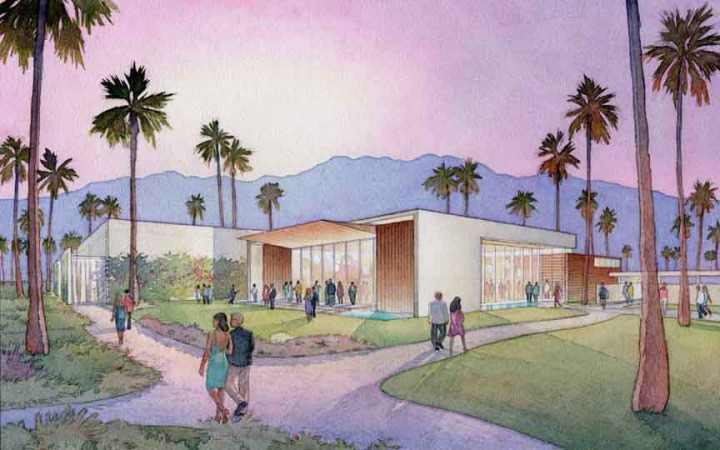 This was an architectural rendering in watercolor done for a really nice architect named David at MR Architecture in NYC.
This was an architectural rendering in watercolor done for a really nice architect named David at MR Architecture in NYC.
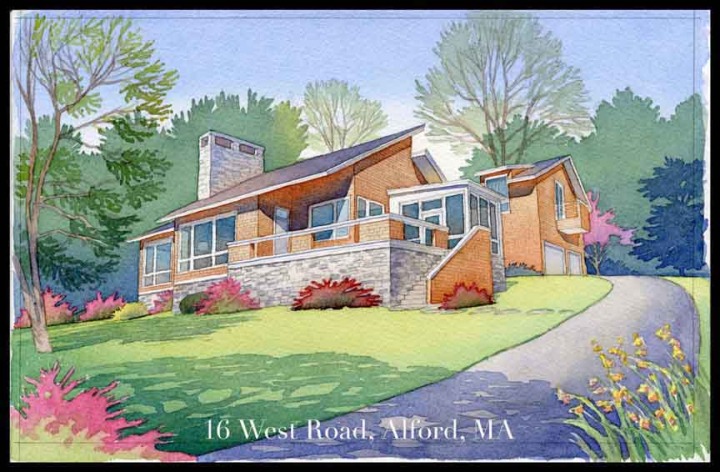 This was an architectural sketch in watercolor done for a speculative real estate project in Alford, MA
This was an architectural sketch in watercolor done for a speculative real estate project in Alford, MA This is an architectural rendering in watercolor of a section of a library (to which Shepley Bullfinch Architects in Boston, MA were making an addition to) at Lehigh University
This is an architectural rendering in watercolor of a section of a library (to which Shepley Bullfinch Architects in Boston, MA were making an addition to) at Lehigh University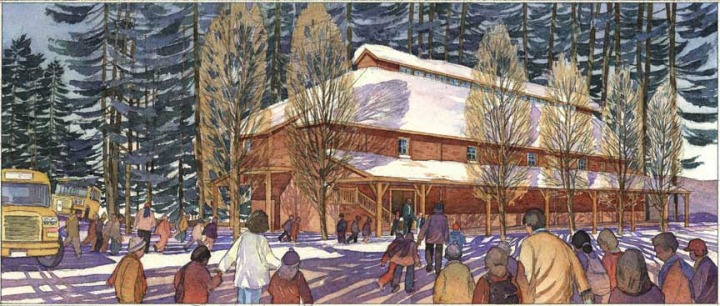 This is an architectural rendering in watercolor of a concert hall for the New Hampshire Music Festival based in Concord, NH by a really nice architect who's name escapes me, but he was a great guy, as were the clients at NHMF!
This is an architectural rendering in watercolor of a concert hall for the New Hampshire Music Festival based in Concord, NH by a really nice architect who's name escapes me, but he was a great guy, as were the clients at NHMF!
A couple of years ago, in 2008, when the financial crisis hit, there was no work in what I do. It just dried up. Actually it didn't just dry up, but at the NYC firm where I did most of my architectural rendering and storyboarding there was only enough work for two people that did what I do and maybe three and I was the fourth guy who lived far away in the Berkshires and who was, if I'm not being too paranoid, just more difficult to work with than the two guys that lived right there in Brooklyn and didn't have families and worked harder than I did and were more talented than I was (no, seriously) so my work just dried up. That's when my wife and I decided we should do something to take our minds off the crisis and do something positive for the world, or at least stay busy like artists do.
 The internet changed the way we shop.
The internet changed the way we shop.
So we came up with this idea to use technology to help local business, which were actually our neighbors in a way but also the people who took the chance to run an independent business which actually made the town nicer to live in and paid taxes and hired local people, so you can see that despite the usual complaint that most people would say that local businesses charge too much, they actually probably don't, considering that they provide instant gratification and service and keep Main Street alive and keep your town vital which probably helps with real estate values.
 It delivered a world of infinite convenience and selection to our fingertips,
It delivered a world of infinite convenience and selection to our fingertips,
It's all just tied up in knots of complexity which are never as simple as it seems. But of course online shopping really messes all that up, and I wouldn't blame you if you were already mad at me, because it's hard to tell someone that they should support local brick and mortar business when they can just say "No, Amazon is so much cheaper and it's too hard to think about that all those other things you say about supporting taxes and school plays and besides, the last school play wasn't that good anyway," (although as an aside I was always amazed when we lived in Summit, NJ and even now living up here in Great Barrington which is the Berkshires how good your average high school play or musical has become, most likely because MTV or something has empowered every generation since after people my age that singing and even dancing but mostly being on stage was not showing off but was self esteem that you should do).
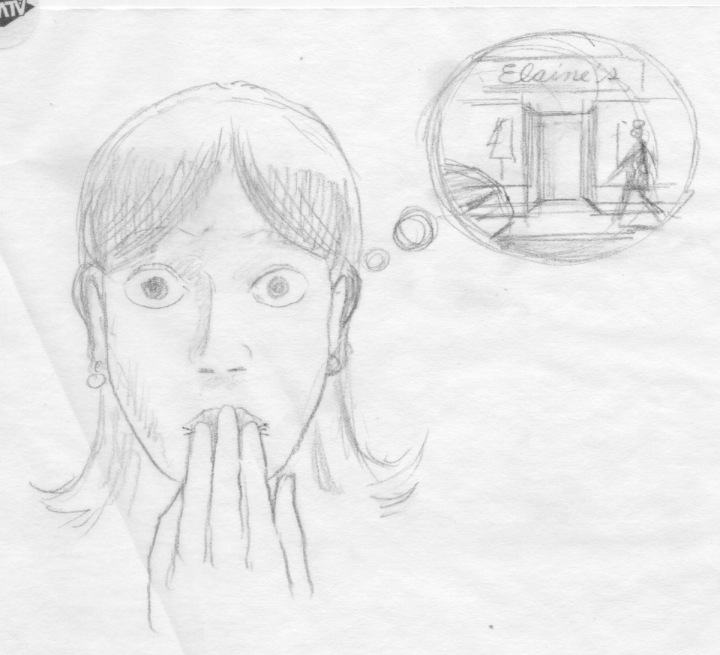 but it didn’t deliver the whole world. In fact, there is a world of remarkable products and services that still remains invisible to online shoppers:
but it didn’t deliver the whole world. In fact, there is a world of remarkable products and services that still remains invisible to online shoppers:
So we thought about the problem and one of the things we came up with was that local business loses a lot of business for the really simple fact that everybody always shops online these days and gets their stuff that way, and there's a lot to be said for that except for the bad things I suggested above, and but the stuff that local business sells right downtown doesn't even appear online, meaning that even though their phone numbers and addresses do and maybe a few photos, that photos of the actual every little things they sell don't appear as fast or in good pictures as the stuff that we buy online from the comfort of our own living rooms on Amazon and in our kitchens. So of course you're not going to buy it locally if you can't even see it online and you're actually shopping at Amazon, or just windowshopping online to know who else has it like Target if you don't like Amazon, because it's not there and its shop keepers who are like us and not like corporations can't afford it to be there, or if you were like our friend Lauralee Epstein who hates to buy her grandkids stuff from online when she could buy it locally here and support Great Barrington, but she just doesn't know what they want in NYC, when all the stores she likes are here and she doesn't have a wishlist, which there is no reason why we couldn't do and you'll see that in a second.
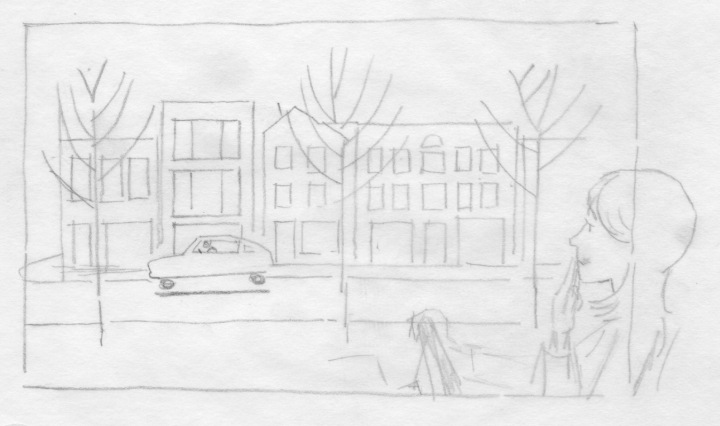 Main Street! That’s right, despite all our advances in technology, online shoppers still can’t see most of what’s for sale in the brick and mortar stores around them,
Main Street! That’s right, despite all our advances in technology, online shoppers still can’t see most of what’s for sale in the brick and mortar stores around them,
In fact you're probably not even going to think about getting what you want to buy online locally because it's like two different worlds--the new world where you buy stuff online that's in your house and you can do fast, and the old fashioned world where you have to go downtown and buy it if you can even find it or if you have the time to go into a lot of stores first but risk getting frustrated that it's taking so long, although not everyone feels that way but I know I do, which is why I'm still wearing a lot of stuff I've had for years unless someone buys me something which I rarely do for myself.
 so even online shoppers who would love to support local default to Amazon, Target and the online retail giants that steal downtown shoppersSo even if you wanted to support local business which a lot of people do, you probably are beginning to do it less and less, and especially our kids aren't going to do it anymore unless we come up with something really clever that tricks them into doing it or makes it more fun like Instagram or Angry Birds, and if that still does good for the world like local food that's even better. Otherwise we're not going to have any downtowns left! Or every downtown will look like really built up places or like the suburbs near Denver where CVS and Revco are on every corner and there are no more really cool little stores, just Starbucks chains, which I seriously hope you aren't thinking to yourself that that wouldn't be so bad given everything i've just been talking about? Because if everything is chains, then the money that they make goes back to the state where they have their corporate headquarters and doesn't stay in the local economy to help schools or anything which has a lot of bad things about it if you follow links to places that research it and talk about it.
so even online shoppers who would love to support local default to Amazon, Target and the online retail giants that steal downtown shoppersSo even if you wanted to support local business which a lot of people do, you probably are beginning to do it less and less, and especially our kids aren't going to do it anymore unless we come up with something really clever that tricks them into doing it or makes it more fun like Instagram or Angry Birds, and if that still does good for the world like local food that's even better. Otherwise we're not going to have any downtowns left! Or every downtown will look like really built up places or like the suburbs near Denver where CVS and Revco are on every corner and there are no more really cool little stores, just Starbucks chains, which I seriously hope you aren't thinking to yourself that that wouldn't be so bad given everything i've just been talking about? Because if everything is chains, then the money that they make goes back to the state where they have their corporate headquarters and doesn't stay in the local economy to help schools or anything which has a lot of bad things about it if you follow links to places that research it and talk about it.
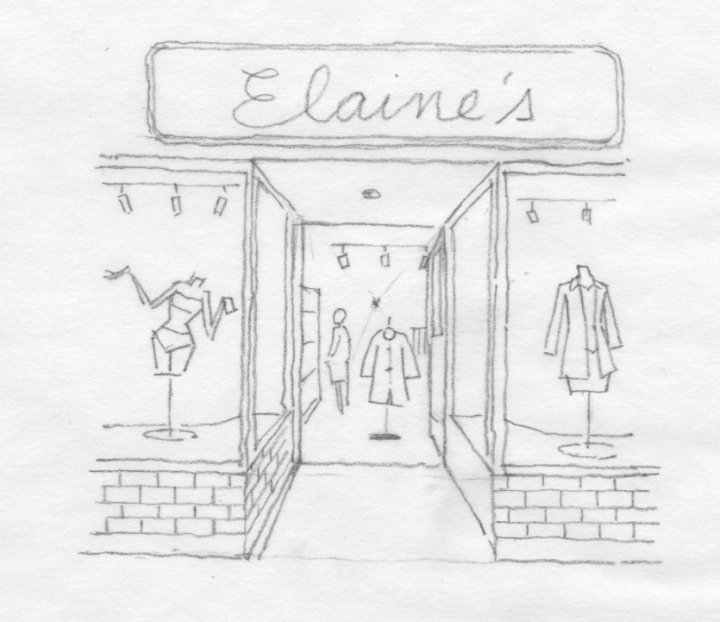 and put the continued existence of local independent shopping at risk.
and put the continued existence of local independent shopping at risk.
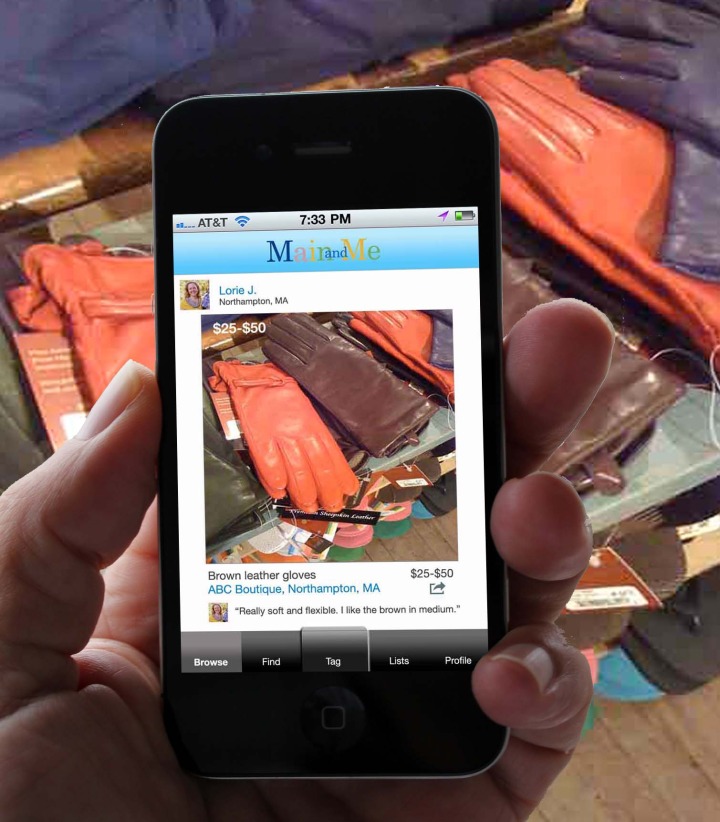 Or at least they did until now. Introducing Main and Me,
Or at least they did until now. Introducing Main and Me,
So even if you wanted to, you just can't see what's for sale downtown because no or almost no independent shop keepers has the money or time to put photos and descriptions for search engines of all their stuff online especially when they have families and kids that need to do homework and have dinner. But what if they had help from accidentally everybody who liked to do all this photo sharing stuff people do now or add stuff to wishlists they selfishly made for themselves, at least at first, or also everybody who supports local shopping or the idea of it as long as there was no skin off their back, or if it was fun like a game? The shop keepers could still do it on their own using this idea if they didn't want people taking pictures in their store, but what if the ones who were still old and cranky and didn't want to change and put photos of their stuff online but were not helping the big picture of getting your whole town online, what if it was fun to help them and they accepted it, or at least the next generation of shop keepers just said, Oh yeh, of course that makes sense like Yelp did or Facebook did to our parents and now look at how everyone uses those? And besides they're not any more technical than you and I and they hate having passwords they forget so even if they could be online it probably wouldn't last very long because they would just have stuff to do like us and forget their passwords and then just say "Forget this, I'm going to run my store the old fashioned way and just have people come in and buy stuff and be nice to them so they always come back next Thanksgiving when they're up here again and don't necessarily want to hang out with their brother-in-law who likes George Bush on Thursday morning, or the day before and after Thanksgiving if they're staying for a couple of days.
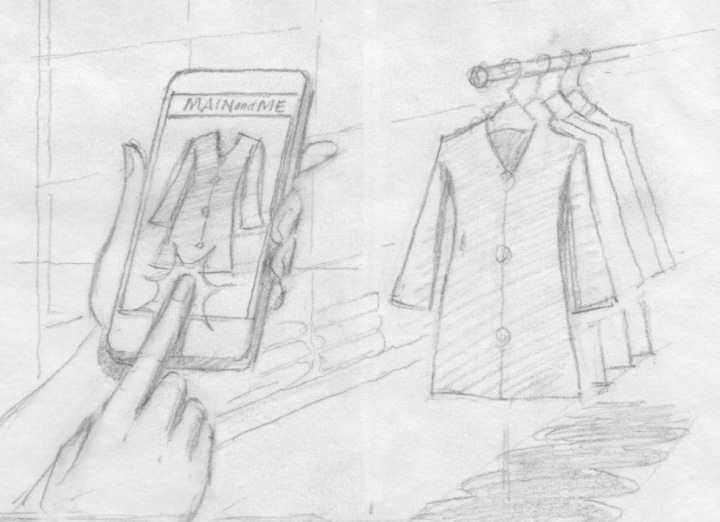 the free-to-use mobile and web app that makes it as simple as “snap...
the free-to-use mobile and web app that makes it as simple as “snap...
So, in a nutshell, local stores are definitely not in the 20th century yet. They're still doing so much the old way and in the meantime Amazon is taking away their business because Amazon and Walmart are always doing stuff the newest way and that's the way a whole new generation of digital natives is learning to do stuff, too, like our kids if you're older, and Foursquare and Yelp and Instagram like I said, but not Facebook so much because that is really getting creepy the way Mark Zuckerberg is never asking for permission to show stuff about you to advertisers, so the future is in trouble, too, which is why you hear a lot of otherwise well-meaning kids who like gay marriage and other things that are good for Democrats still shopping at Amazon even though they don't know yet that that's politically uncool, or hopefully will become really uncool like wearing fur and sugar or spending too much time on Facebook pretty soon, and buying locally has this really practical message like local food that says "Hey, this isn't just kidding around or something online, this is actual," or it could be if we get this message out.
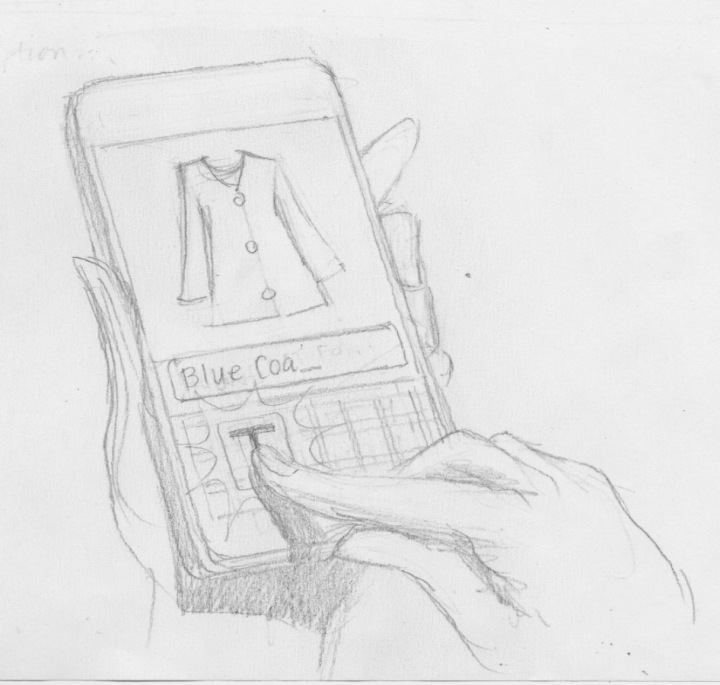 caption...
caption...
So that's when we got the idea to make it as easy as snapping, captioning and checking in a photo to start an online store for yourself if you didn't have one with as many photos as you wanted and hopefully even every single thing you sell, because why not, you could just ask that high school kid that works for you to use their smartphone to do it if they were just going to be doing their homework anyway in the afternoons, and then take all the stores in the same town that started their own page and automatically put them also into a page for your whole town, so that you could either shop store by store or windowshop the whole town all at once like if you were going to Cape Cod that weekend and you wanted to see what was the cool stuff for sale in their stores before you got there, or any place else since we would want the whole country to do this to revolutionize local shopping and make it just as powerful as Amazon. Btw, did I mention we wouldn't let Amazon on? or other national brands since they already have the resources and this would just be for local shopping since that's the world of shopping and the stores that helps our actual places where we live.
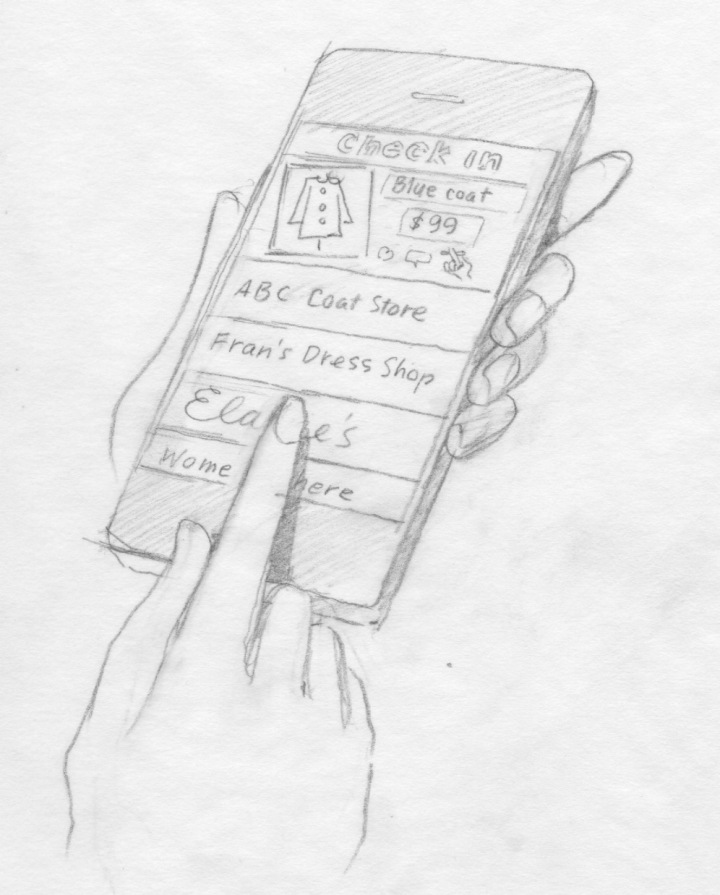 and “check in”...
and “check in”...
So we thought, let's do this! Let's use something fun that everybody does anyway to do this not-so-accidental really positive thing of also putting everything for sale at local brick and mortar stores of every town online to help out local stores--which is why we call it "Main and Me" instead of something like "Me and Me" which would be all about Me like everything seems to be these days--so that whenever people start shopping online, the stuff that's for sale locally shows up just as first as Amazon. So that's how Main and Me was born, which is hoping to someday tap into the energy like the local food movement where people say you should eat locally because my friend grew the lettuce and it cost less gas to get it here, so the same way you can shop locally and make your town healthy, even though there are a lot of detractors in this world, too, that say the price will always be too high, or that it doesn't always save gas to not use overnight delivery or UPS, or like my one friend who says even buying stuff is bad because we don't need more stuff and if you do you should buy used stuff that's just as good as new on eBay, and she does.
(to be continued)
 for resource-challenged merchants and downtown directors to begin putting Main Street online in a day.
for resource-challenged merchants and downtown directors to begin putting Main Street online in a day.
Well, readers, this marks the introduction of the start up mobile and web app that a team of us have been working on for the last year. BuyLOca is 100% intended for the use and benefit of the LOCAL independent businesses who... well, wait, I'll just copy in the press release. Enjoy, and be sure to check out the wireframe diagrams at the end of how the mobile and web app will work.
Press Release, May 21, 2010
from BALLE conference in Charleston, SC
Introducing buyLOca (in beta)...
A Shopper-driven Solution For Sustainable Local Ecommerce
BuyLOca is the mobile (iPhone) and web app that allows shoppers to make photo-based wish lists--tagged with price, location and store name--then share them with friends and family via email and over social networks (because who couldn't use a little help with the 50 gifts--from birthdays to graduations to holidays to housewarming parties that families of four feel "obligated" to exchange every year. Make that 25 for couples without kids.)
BuyLOca is, of course, meant to be a huge convenience for shoppers, but it's also designed to do something VERY cool for local independent merchants and service providers. The magic occurs when buyLOca aggregates shoppers' wish list photos to both users' homepages, and to FREE "wiki" store pages for the local businesses from where items are listed (since 90% of these businesses lack the resources to build their own ecommerce capability and can use the help in competing with malls, big box stores and online retailers!). Bottom line? As shoppers share their wish lists via email and social network: 1) THEY get what they really want from friends and family on gift giving occasions; 2) BUSINESS OWNERS get free ecommerce pages (built spontaneously from their customers' wishes, which turns out to be an efficient and powerful form of online search recommendation engine) and viral word of mouth advertising over customers' social networks, and; 3) the NETWORK EFFECTS create a virtuous cycle and drive even MORE TRAFFIC TO LOCAL BUSINESSES and BUY LOCAL PROGRAMS .
Additionally, as growing numbers of store owners add items and services to their free pages, local goods and services in general become more visible to ORGANIC SEARCH (where according to Forrester Research, an astonishing 90% of all discretionary shopping begins these days), allowing random online shoppers to find the goods they're searching for LOCALLY before they reflexively venture off to malls, big box stores and online retailers. The fact that wish listers and their favorite stores will tend to be in the same area means that buyLOca will also save last minute gift buyers (i.e. all of us) the growing expense of 1-,2- or even 5-day shipping typical of last minute online purchases.
In summary, buyLOca helps--at the scale of the individual online and offline shopper--to make the connections between producers and consumers that the best Buy Local networks seek to make, and SHIFTS a portion of day-to-day shopping--starting with gift buying--back to the local businesses that form the heart and soul of our local communities (and--in striking contrast to the policies of national chains--the supporters of our local Little League teams and High School Musicals:).
Although buyLOca begins as an app that makes gift giving easier, more accurate and more meaningful, its MISSION is to revolutionize local ecommerce and help sustain local economies by: 1) cataloging and uploading local goods and services "one wish list at a time;" 2) encouraging local businesses to upload more of their local goods and services to their free pages, and; 3) laying the foundation for a mobile and web channel that allows a million-plus resource-challenged local businesses to extend the geographic and seasonal markets for their goods and services to a global online and mobile audience.
BuyLOca is looking for communities that would like to help us beta test the service, and for angel investors who would like to be a part of the team working toward a 2010 holiday season launch. Please call Jamie Akers at 413-250-8800 if you wish to help with either. Thank you for your time, and remember, we are in beta, so we invite you to help us make buyLOca better with your suggestions in the comments section.
The following diagrams--though one generation old--give the general idea for how the mobile and web app will work.
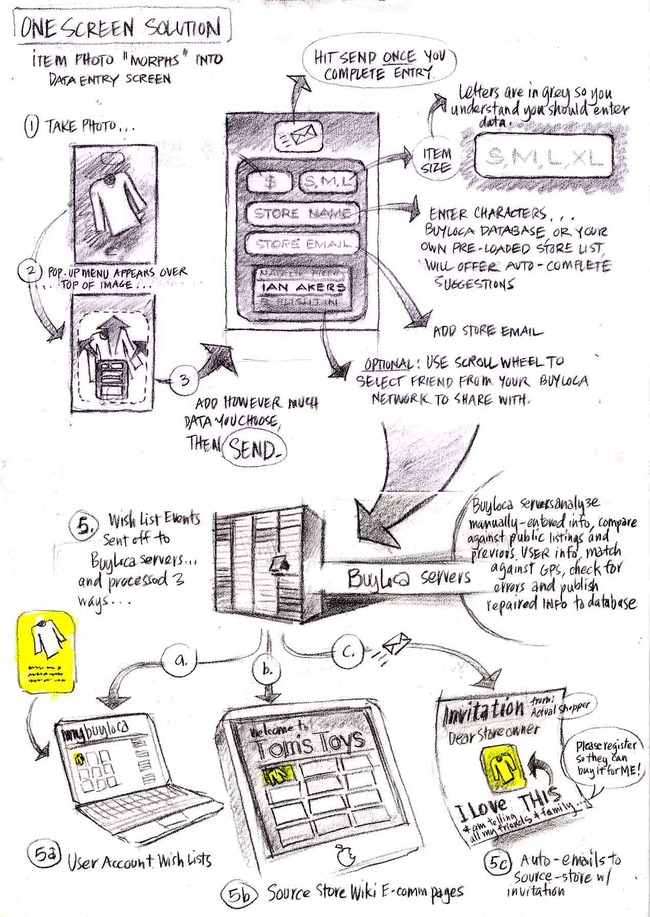

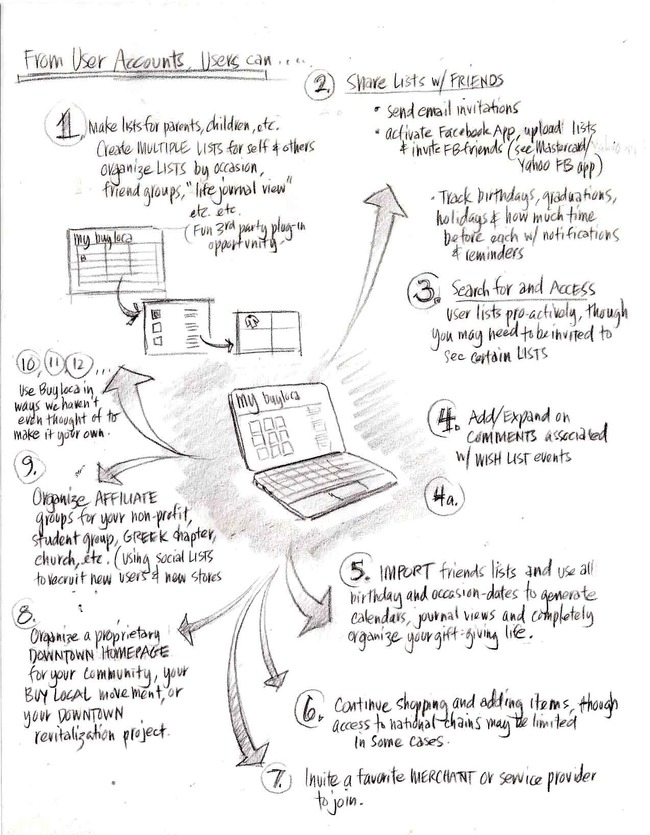
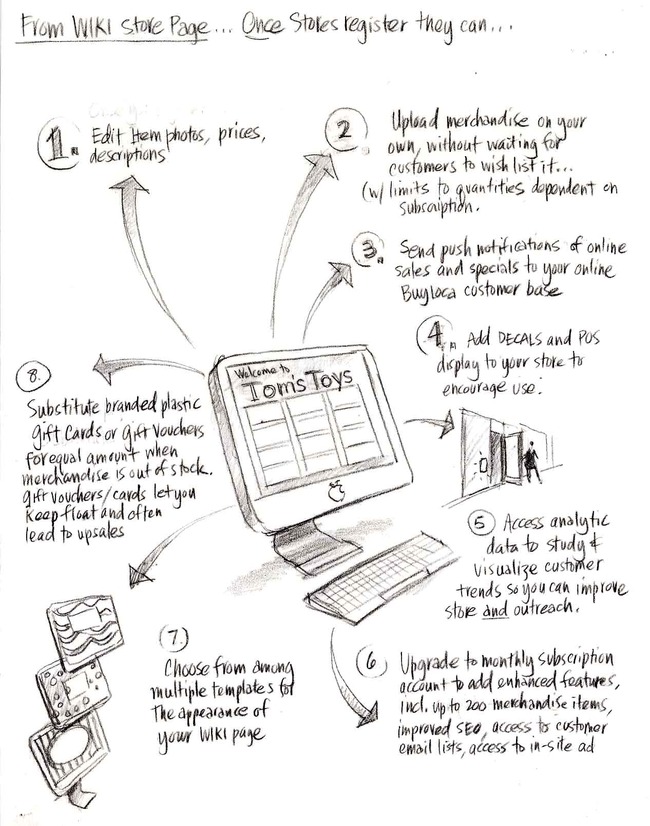

(The First In A Series Of Posts About Figuring Out The Next Thing We--And There Are An Awful Lot Of Us--Are Going To Do)
Are you an architect, designer or construction professional unemployed or otherwise disenfranchised by the economy of 2008? (We won't get into the politics, but ask yourself who was in charge from 2000 to 2008?) If so, you, like me, have been trying to figure out what to do. The answer, I believe, is to start up a company. Who better to do this than architects and designers? We're entrepreneurs by nature. We have always worked long hours for little pay (don't you just laugh when you hear investment banking and lawyer friends whine about how hard they worked when they were coming up?) we are born problem solvers, we shun group think, we think about life in philosophical and even metaphysical terms, we welcome chaos, we are skeptical of easy reductionism, and we know how to communicate our ideas in compelling ways. Who better to start up a world-changing business?
Now for the bad news. Statistically there is a 90% chance your start up idea won't work, but if you start off being realistic about that, you won't be too bummed if it doesn't happen. In the meantime, you will have embarked on the most rewarding journey you've taken in years, keeping your mind off unpleasant hypothetical scenarios while reacquainting yourself with everything you were once passionate about. (That, plus an actual reason to spend all day on the internet!)
So how do you start up a start up? (Important: for the purpose of this conversation, starting up a start up counts as a start up. Good, right?) I can only share what my method has been, but it's generic enough that it can't hurt as a place to begin. To those of you who got on this start up thing a year ago, please skip over the material that you're already familiar with. Consider this a table of contents for a series of posts to come. We'll get into detail as we address them.
Coming Chapters Overview:
Find A Pain Point And Solve It (today's entry)
Forget "Regular" Google (despite how awesome this link is): Focus Your Start Up Searching With Podcasts and Google Reader (also partly covered today)
Which Podcasts To Start With?
How (And Why) to use Google Reader instead of Google search
audible.com (because reading pales in comparison to listening during exercise, housework, etc)
Squarespace.com, because you need a blog, not a website
Chris Anderson and his two amazing books Free and The Long Tail
What is the "long tail" of a market and why do I need to know?
Bo Peabody and his awesome book Lucky Or Smart
David Silver's book Social Network Business Plan
What are Foursquare, Yelp, Gowalla, Brightkite, and other social/mobile apps and why do they exist?
What is meant by "mobile" or "social" With Respect To Apps?
What Is The Coming Mobile ayment Revolution?
How Does Google work?
What's An Elevator Pitch
Why Can't My "Deck" Be More Than 5 Pages Long?
What's A Deck?
Where do entrepreneurs live and why?
Why you should...or sholdn't...hire a "business strategist"
How much equity should you give away,and to whom?
What's "domain" expertise?
What's the difference between "friends and family" "angel" and "venture" capital?
Who should be on my start up team (and why do I even need one)?
Where do I get an iPhone app built?
What's Next?
Chapter One: Find a pain point and solve it. Welcome to the most fun phase of starting up a start up. (Enjoy it, 'cause it only lasts for about 3 cocktail parties) In a nutshell, a pain point is a common and compelling problem crying out to be solved. I'm going to contradict myself and expand this point right away because its far and away the most fun. Here is a sample list of pain points and solutions I've explored over the years. When you finish reading, put your idea into the same context. It'll be fun.
Pain Point 1: It's difficult to water my Christmas tree. Solution: The Pournament! an ornament hung at waist level that's really a funnel connected by clear plastic tubing to the water reservoir of your tree, so its easy to fill and doesn't require you getting down on your knees and fighting with spiky, overhanging branches. That, and it tweets when the water level gets too low. (See what I mean about the difficulty of execution? We're 2 minutes into idea 1 and already I have to go find some insane company in Hong Kong that makes a microchip that detects water level and fits inside a fake tree ornament).
Pain Point 2: Half the food in my refrigerator gets shoved to the back and gets all funky before I eat it. That and my shelves are skanky. Solution: The Lazy Susan Refrigerator. Each shelf is a circular lazy susan shelf and you just rotate them to find any and everything and eat it or use it in time. (Does this exist? I don't know, I've never seen it, but wouldn't it be sweet?)
Pain Point 3: It's boring to drive my car down the highway without somehow taking advantage of all that 70 mph wind all up in my luggage rack. Solution: The Carliope, an enormous 8' long x 4' wide mouth organ for the top of your car, similar in concept to an Andean flute (see: Subway Entertainment>New York City> circa 1985) and capable of generating the kind of deep, resonating organ notes and ear splitting volume normally associated with the movie E.T. Dash-mounted keyboard comes as standard equipment. Just imagine riffing on "Inagoddadavida" at 70 mph while barreling through Wilkes Barre on Route 80. Or waking up everyone in the McMansion subdivisions just over the sound-proof barriers lining Route 80 between Morristown and Somerville, NJ. Come one, admit it...it's frikkin' genius.
Pain Point: I live in a large city, and when it gets hot in Summer, the selection of popsicles is always limited to the same boring shapes and flavors. Solution: City 'Cicles, a licensed line of popsicles in the shape of a given city's most famous landmarks. This then leads to a line of popsicle and tray ice molds you can buy and use at home.
OK, got the hang of this? Find a pain point and solve it. Btw, I've got about twenty more ideas like this. Seriously, I can't turn my brain off. Is this an architect thing? I'm telling you...this is fun!
2. Chapter Two: Forget "Regular" Google (despite how awesome this link is): Focus Your Start Up Searching With Podcasts and Google Reader. Google is great, but these days the first few pages of the average Google result can be crap. That's because people who are crappy at their day jobs tend paradoxically to be very good at promoting their sites with SEO. This previous statement is, of course, very unfair, but there is some correlation between becoming slowly dis-enamored of what you do for a living (your website) and wanting to just have more fun promoting your website (SEO). (Did I mention one of the benefits of starting up a start up is that you get to use cool new abbreviations as if you understood them? Just this once I'll spare you a trip to Wikipedia and tell you SEO = search engine optimization. It's the techniques you use to make sure your web page--or your blathering blog posts about architects starting start ups--get noticed and ranked on Google). Anyway, you can get really burnt out searching the first 15 pages of Google results for every one of the many subject areas you're going to need to research for your shiny new start up, and realizing the system has been gamed to death by advertisers and spammers and link farms (see all those cool new words?) will quickly become frustrating. Solution? Podcasts first, then Google Reader.
Podcasts are an unparalleled and, if you find the right ones, incredibly entertaining source for three kinds of information you're going to need to a) figure out who, if anyone, has already done your idea, b) figure out the leading authorities in the domain of your idea, and c) I can never remember the third thing when I make the mistake of stating ahead of time there are three things. There should be an app for that? But seriously, podcasts. Here are several amazing ones that, if your idea has anything to do with tech, you will thank me for:
The twit.tv network was started by a guy named Leo Laporte who is sometimes lovingly referred to (by the geeks that make up the ranks of his guest hosts) as the "president of the internet." It's actually kind of cute--or pathetic?--because, well, what happens as you listen to these things is that you feel as if you're hanging out with a bunch of dweeby kids from high school computer class who made it big, but kept that unique sense of humor that I, for one, have always associated with MIT grads and really smart people that like to walk fast and smell of garlic. I keep as many as possible as friends. The notable geeks that guest host with Leo on these programs include Gina Trappani, Jeff Jarvis, Alex Lindsay, John C. Dvorak, and my two personal favorites, Merlin Mann and Andy Inhatko. Andy is the smart Mac-savvy kid you secretly wanted to be in high school, except you wanted to have a life and a girlfriend and you just couldn't see yourself in a leather hat.
At the other extreme is Jason Calicanis, the host of TWIST (This Week In Start Ups) who, having hailed from Brooklyn, growing up a nerd (and possibly being the kid who was frequently hung up by his jock strap in gym class), moving to the west coast to write about tech, then eventually starting both Weblogs.com and Maholo.com, is such a conflicted mixture of gangsta wanna-be, legit millionaire success and broadcast-sized social dysfunctionalism that it's all you can do to not be mesmerized by the self absorption and drop-dead utility of his weekly hour-and-a-half show. Simply amazing. Btw, start with the episode where he interviews Gary Vaynerchuck. As a start up, you'll be hearing a lot about Gary if you haven't already.
So that's the lovable world of geeks I've been spending far too much time with recently.
Where was I? Oh yeah, podcasts...and Google Reader. Let's do Reader tomorrow, but for now, Podcasts: make them your number one source of information and entertainment for 6 weeks and you will absorb more than you would on straight Google in a year. Seriously. Do this. Now.
--
James Akers
413.250.8800 mobile/text message
www.akersarchitecturalrendering.com (new)
(Note: Welcome to the startup and angel investor community on LinkedIn. Please visit the portfolio portion of this site to see other examples of architectural--building, software or otherwise--visualization techniques.)
Entrepreneurs have a lot on their plates--finding pain points to solve, raising funds, choosing between iPhone, Android, and now iPad platforms, cutting through crowded marketplace noise, etc. Great ideas must elegantly solve pain while being fun to use, hyper-efficient to navigate and joyous to spread. UX (user experience) designers know they're going to lose half of their audience with every click, so making mobile and web apps simple, stunning and "sticky" is job one.
UX design is central to any web 2.0 start up conversation. There are many wireframe programs available to help, but the medium is the message, and these aides tend to make the apps they help create look the same. Why not follow the lead of movie directors and entertainment designers and use storyboards to nucleate your vision, get team members on the same page, and communicate to investors in a striking and company-differentiating way?
Taking the metaphor a bit further, UX design is a lot like set design (see samples included) only your stage is held in the palm of your hand (on your mobile device). Providing examples of storyboarding will be a recurring theme in this blog, beginning with some in-progress and very rough UX sketches for a social mobile start up being developed right here in western Massachusetts. (Yes, western Massachusetts. Afterall, we were home to Bo Peabody and Matt Harris's Tripod, so we can certainly do it again.) These begin as rough pencil sketches made in real-time working with developers around a table, and evolve after many iterations into publishable memes that tell your story. I can't tell you much about the startup idea involved here, but the clever ones among you may figure it out.
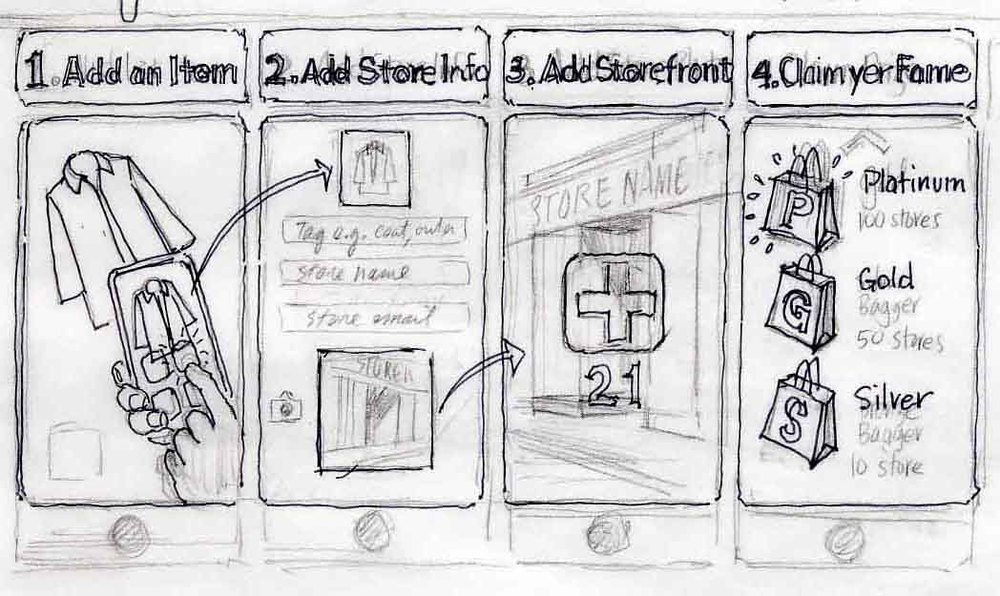
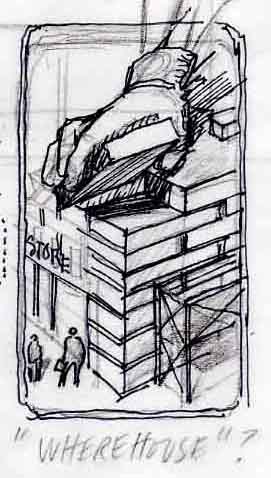
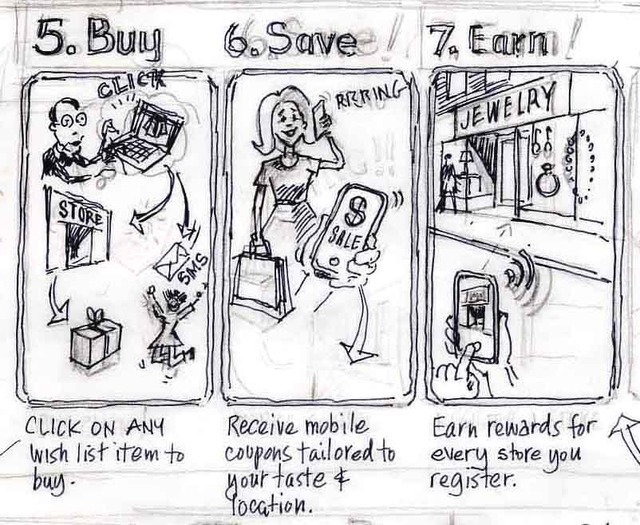
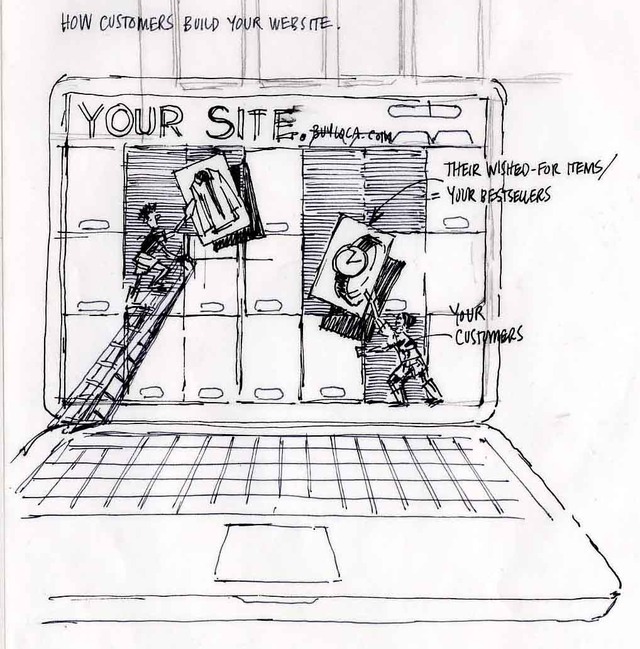
That's it for the UX stuff I can show on this project. Below are a sampling of storyboards made in collaboration with famed set designer/architect David Rockwell, and several other firms doing work in the entertainment industry.

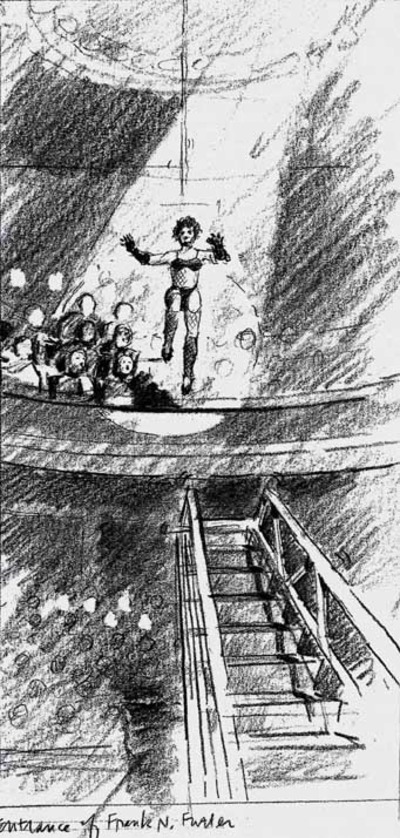
The moment of Frank's Entry in the staged production of Rocky Horror Picture Show.
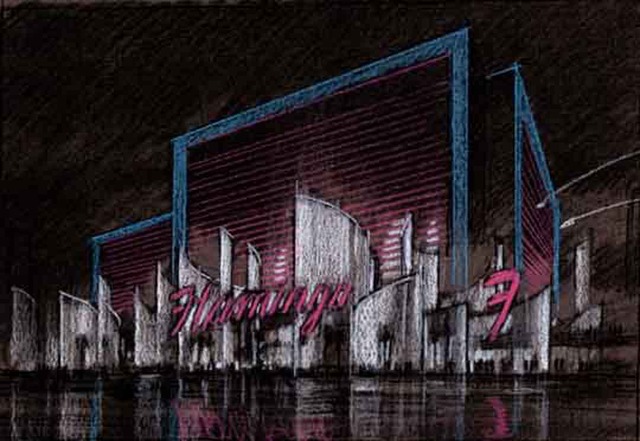
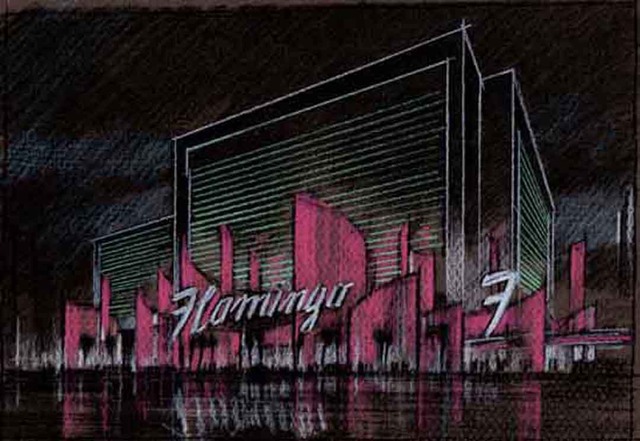
Studies for the "reinvention" of the aging Flamingo Casino in Las Vegas.
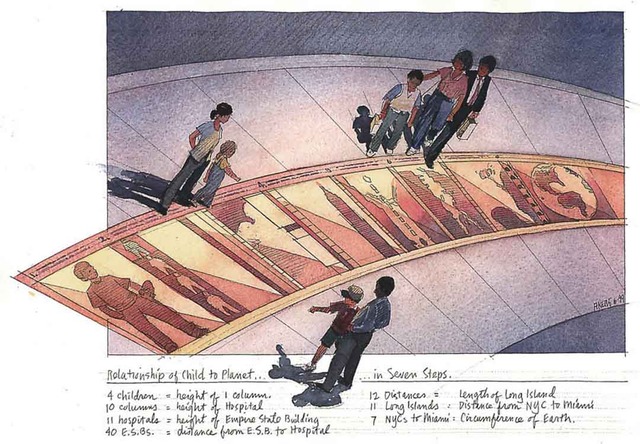
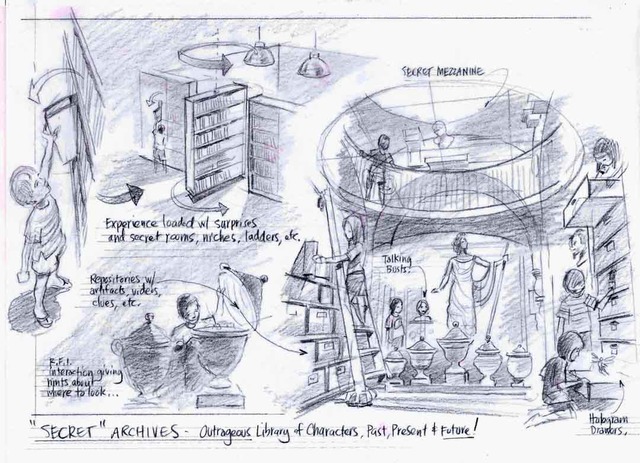

Thanks for coming, and please stay tuned for more on how storyboarding can help your startup (or startups if you're an angel investor) focus team effort and get to launch faster.
Appendix: Here are some keywords which will help readers index this article:
architectural rendering
watercolor techniques
architectural renderings
architectural rendering techniques
watercolor rendering techniques
pen and ink techniques
watercolor rendering
watercolor techniques
architectural sketches
watercolor rendering techniques
watercolor techniques
architectural watercolor rendering techniques
pen techniques
different watercolor techniques in rendering
architectural sketching
pen and ink
sketching techniques
architectural rendering in watercolor
rendering watercolor
In advance of the hot tub rennaissance sure to happen with the release of the art film "Hot Tub Time Machine," I submit the question: why can't one rent a hot tub on wheels? Can somebody get on that please?
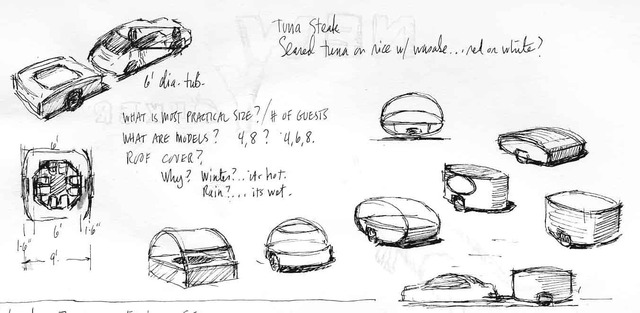
Hop on the waitlist for the Live Draw-Along Workshop and I’ll send you details before anyone else.